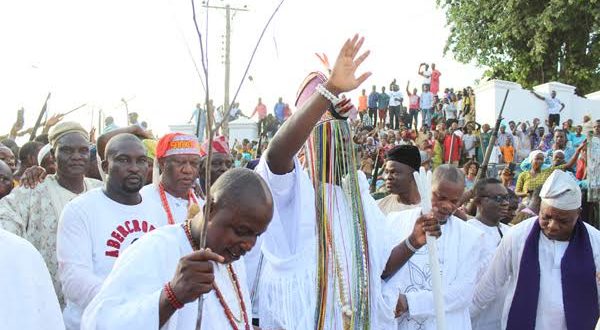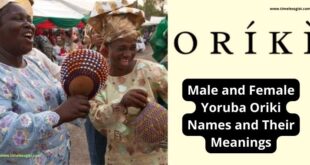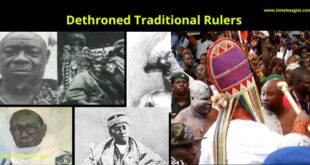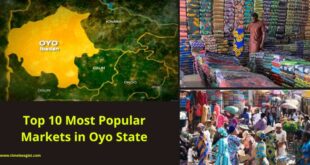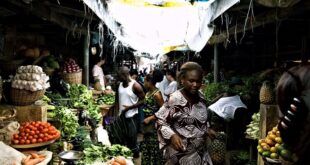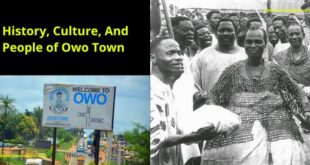The history of Ile- Ife dates back to the time of ancient civilization which is unwritten, legendary and to an extent mythical which is majorly based on oral tradition gotten from the Yoruba Ifa literary corpus “which Orunmila is the great intellectual personae” ( Oluwole , 2016 ; 22 ) which could be found in the Ifa divination ; Odu –Ifa , Ese – Ifa , Iyere – Ifa etc. A system of 256 geomantic figures which thousands of text are attached . . . An essential part of the training of the Babalawo is the commitment to memory a substantial number of over four thousand major verses of this literary corpus. All prominent scholars of Ifa testify that the corpus is a computerized storage of Yoruba ancient knowledge in all areas of their rational endevours . Many Ifa texts are treatises on religion, philosophy, law ,politics , education , poetry , sociology etc. . . ( Oluwole , 2016 ; 23 ) . These are all legendary and mythical stories told by lineage of ancestors to generations of their children and wards . Some of these chanted stories and esoteric knowledge of Yoruba tradition , culture , religion ,customs and world views ,lived through generations learnt , recited , transmitted and handed down from generation to generation. Oral traditional history was of the concept and belief that Ile – Ife was first in creation. This was asserted to be the original home of all things . She was said to be the land of the first dawn Ile- Ife Ooye lago , Ile –Ife o daye , Ibi ojumo ti mo waye meaning Ile – Ife , the land of the first dawn and place where the sun rises.
Also read: 700+ Yoruba Names and Their Meanings in 2022
Ile – Ife , the enchanted holy city of the Yorubas , the home of divinities and mystics where humans and spirits co – habits . Through this fact one is instructively informed that the real keynote of the life of the Yoruba is neither in their noble ancestry nor in the past deeds , heroism . . .in their religion . In all things they are religious . Religion forms the foundation and all governing principles of life . ( Idowu : 1962 ; 5 ) Ile – Ife and Benin in recent time has been said to be home of antiquities and ancient works of art whose age and origin remains a mystery . The dignity and serenity of their expression and technical excellence of their workmanship remains towering amongst world masterpieces of arts .
According to Oral traditional historians , the history of the founding of Ile – Ife could be linked with two traditions of origin. First , the story of of the creation of the world in which all humans remains mystery and riddle which remains question through ages . In Yoruba belief , Ile – Ife is the spot where OLODUMARE , GOD in Yoruba belief created man , black , white , colour , mongoloid and it is from where they were all dispersed to different parts of the world . Therefore it is believed that sacred spot known as “ EDENA “ ( adjacent the the palace of the Ooni of Ile –Ife ) – the historical garden of Eden which to an extent is instructive in the similarity or semblance between Edena and Eden Bolaji Idowu averred Ile –Ife , the first of creation …the original home of of all things : the place from which the day dawns :the enchanted , holy city : the home of divinities and mysterious spirits. . .( Idowu , 1962 : 11 )
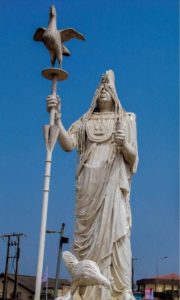
A tradition of origin says that ODUA / ODUDUWA, the progenitor and founder of the Yoruba nation was the one of the people who lived before the deluge and after the deluge , he , with his followers and members of their families , descended onto dry land with a chain – rope from their live boat which anchored on Oke – Ora (Oramfe’s hill ) Itagunmodi ( in Ijesaland ) and Ile- Ife , from where they came to Moore quarters in Ile – Ife . This points to the fact and reason why Odua and the people who were saved from the deluge were known to those who they met at Otufe , ancient Ile – Ife as Ooye or Ooye lago “ awon ti won ye “ – those who survived or were saved from the deluge . In many African societies and communities today, traditional festivals are held from time to time except in places where values culture, customs and traditional heritage and virtues have been totally eroded or lost to foreign indoctrination, cultures, religions and values. The Yorubas can be found in Nigerian Southwestern States, some parts of Kogi State, some areasin the Republic of Benin, some parts of Brazil, Cuba, Trinidad and Tobago and other South American nations. Culturally, Yorubas love ceremonies and festivals. Yoruba people are homogenous in culture and speak a common language said with dialectal varieties: Awori, Akoko, Edo, Egbado/Yewa, Egba, Ekiti, Ife , Ijesa, Ijebu, Igbomina, Ikale, Ilaje, Itsekiri, Sabe, Yagba, Ondo, Owo and so on. But to a large extent, they are united in culture, heritage, tradition and history with claims that they all originate from Ile-Ife and are all descendants of Oodua Olofin-Aye. (Biobaku 1973).
Also read: History and video of Oba Oyekan of Lagos coronation in 1965
Ceremonies and Festivals give them joy, happiness and sense of fulfillments and celebration. In Yorubaland, people constantly approach different divinities: Ogun, Sango, Oya, Obatala/Orisa-nla, Osun and so on for their needs especially during festival period dedicated to them. Most Deities in the Yoruba pantheon are either heroes or heroines, who had distinguished themselves in various human or super natural endevours achieving great feet in overcoming and helping to suppress great challenges that once confronted their communities. In order to show appreciation, respect and honour them for their heroic deeds, they are deified. These divinities are held in very high esteem by their devotees and adherents who worship them and annually dedicate a period of the year for the celebration of these men turned gods and goddesses become intermediaries between Olodumare – the Supreme Deity/God and man (Idowu, 1962).
They are approached from time to time to intervene on their behalf as regards various issues of life challenges. For man to continue to enjoy the goodwill, blessing and favour of the gods, he must continue to appease them (Biobaku, 1977:87).
In a typical African traditional setting, festival remains a great artistic institution which has the frame work which coordinates all forms of activities in a community.Turner summed this up in this statement “After many years as an agnostic and monistic materialistic I learned from the Ndembu that ritual and its symbols are not mere epiphenomena or disguises of deeper social and psychological process, but have ontological values” (Turner, 1975:32-32, also see 1974:57).
According to A.F. Opoola, festivals are celebrated based on people’s belief in gods or deities who are objects of worship as a result of their powers when they were alive. She said further that some gods are rated high and their festivals are celebrated by only a few people (2006).
Festival therefore can be seen as events held in honour of deities or humans made gods to show how high they are rated and how much the worshippers respect them. Festivals reflects the rich tradition and culture of the people of a community and they portray their beliefs and customs. Festivals are celebrated periodically to mark certain historical events and seasons. For instance, the new yam festival is celebrated annually in some parts of Africa. This heralds harvesting and eating of new yam. It is also the occasion harvest in the coming year. The celebration lasts for a minimum of one week and maximum of a month or three months in the case of series of pantheon festivals. It is always a period of merry-making featuring eating of specially prepared delicacies and, drinking of palmwine and other assorted drinks.
In most communities in Africa, the kings and priests have important roles during festivals. It is the responsibility of the king, and by extension, the Priest to ensure communal recreation and it is their obligation. Adegbola, (1983) notes that festivals provide recurrent and social opportunities for communal recreation and social revival. He stresses that recreation is a special province of gods. It is in festivals that man revitalizes god’s creation so that it does not become ancient history but present reality. It is the creation of historical (natural and social history) aspects of festival. In most Yoruba communities the Oba (king) and the Chief Priest are responsible for consulting with the Ifa – Orunmila Priest in choosing dates for the festival celebrated annually ..
Ogunba (1967), in his study of ritual festivals among the Ijebu people, categorized festivals into five main categories:-
1. Royal festival
2. Hegemonic festival
3. Festival of purification
4. Festival of songs
5. Festivals of women
In furtherance to Ogunba’s assertion, festivals in Africa are more than the above mentioned categories. We have such other festivals like
6 Seasonal festivals and others
Traditional festivals, as celebrated in the various communities of the African continent, reflects the tradition, culture and history of our ancestors / forefathers in the ancient times. Traditional ceremonies in Yorubaland is seen as entertainment and at the same time serious religious rituals issue which serve as a way of communicating with gods and ancestors, for instance, among the Yorubas. the various ceremonies; Obaship/Chieftaincy installation rites and annual traditional festivals of our various communities constitute the rich resources of historical, traditional and cultural knowledge. For example among the Edos Yorubas and Ashantis, being people with very rich and vast monarchical tradition and practices, the people owe their history and lives to their king and festivals as a way of communicating with the gods and ancestors.
Festivals showcase the history of a town and movement or migration of the people from one place to another. This, Olaoba, (1991:44) affirms by stating that the Agunlele Festival in Itaji reflects the historical beginning of Itaji kingdom and its political culture. In most Yoruba societies, there is seemingly cultural uniformity nowadays. The installation rites of Yoruba Obas and the celebration of festivals annually reflects the history of the people about how Obaship or kingship of the community began or came to existence and the political power, influence and general circumstances that surrounds it. For example, the Ijesa Obokun people dedicate one month of every year: mid-November to mid-December, to celebrate the Ogun Festival – the pathfinder and god of iron and steel. It commences with “lilu agogo ogun” (beating the ogun gong) to its grand finale known as Iwude Ogun but now renamed Iwude Festival.
Types of Traditional Festivals In the Yoruba Society
There are various types of festival in the Yoruba society. These include:
Igue Festival in Benin
Olojo Festival in Ile-ife ;
Osun Festival in Osogbo;
Aworo – Ose festival in Ila – Orangun;
Oke’badan Festival in Ibadan;
Ogun Festival in Itaji;
Obalogun Festival in Ilesa and Iloko-Ijesa;
Festival of Salt (Odun Oniyo) in Osu-Ijesa;
Irele Festival in Ikirun;
Erinle Festival in Ilobu;
Sango Festival in Oyo and Ede; and
Iyamopo Festival in Igbeti.
Osun Festival in Osogbo
Ogun Festival in Ijesaland
Also read: Top 10 Recruiting NGO Jobs in Nigeria you Should Explore
OLOJO – THE DAY OF FIRST DAWN . Ojo ti ojo di ojo meaning the day when day became day .It is symbolic that Cock crows at dawn .It is instructive to humanity that OLODUMARE – THE ALMIGHTY GOD appointed cocks to be the indicator of time . Cocks does not have clocks but Olodumare input in then innate ability of time . God use cocks to wake humans and remind them that it’s a the dawn ofa new day .Olojo festival at Ile – Ife, the craddle of the Yorubas through Ogun the pathfinder , god of Iron and Steel and messanger of Olodumare .Olojo is the day is the day OLODUMARE – GOD created the universe Olojo could otherwise be coloqually be translated as Owner of the Universe . OLOJO festival also known as festival of life is commemorated annually to appease the ancestors of Ile – Ife in order to grant the Ooni and his subjects good health , peace , prosperity and long life . Prior to the celebration day the Ooni goes into spiritual isolation where he will embark on extramundane communication with the ancestors to secure the welbeing and welfare of his people. The women prior to his arrival clean the Ooni’s palace and make the Ile – Ife royal court very tidy . Okemogun is very signicant and key to the celebration of the Olojo festival . It is the spot believed to be the place where the first dawn came into existence . The Ooni offers prayer for the peace and tranquility of Ile – Ife , Yorubaland , Nigeria and the world .
The Ooni goes into spiritual seclusion and engages in communion with the ancestors . This spiritual retreat makes him spiritually cleansed , pure and ensures the efficacy of his prayers . He observes this period of spiritual retreat and isolation for not less than five ( 5 ) days . Before he appears the women from his paternal and maternal family lineage sweeps the Ooni’s palace which is a very symbolic clean up of the royal palace to word off evil . The Ooni Orisa later appears in public with the AARE Crown which was an inheritance from Odua Olofin Aye – the Progenitor of the Yoruba nation.
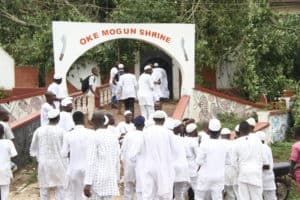
Watch the sacrifice process at oke mogun here
He leads a royal procession of chiefs and prieststo the Ogun shrine ritual obeisance before heading for the ceremonies at Okemogun shrine in midst of huge crowd and sounds gongs – Agogo Ogun . At Okemogun , he performs his spiritual cum divine duties of renewal of pacts . By the foot od Oke-Itase , the ritual of divination is observed for the Ooni Orisa by the Araba ,
the Chief Priest of Ile – Ife and from there he visits other traditional spiritual and ritualistic places of importance .The traditional Chiefs of Ile – Ife dressed in their traditional ceremonial attires and holding their swords marked with chalk and camwood dance to the rythm of bembe drum . At the turnof each of the traditional Chief , the rythm changes in tune while the Ooni dances to the tune from rythm fromthe Osingi drum .
This is the biggest festival on the tradition festival calendar of Ile – Ife . Olojo – Controller of time , authority behind life and death – OLODUMARE – THE ALMIGHTY GOD is celebrated in remembrance of Ogun, the god of iron and steel . The festival takes place annually in the month of October and involvesseveral elaborate ritual prayers led by the Ooni of Ile – Ife . It is marked by carnival like atmosphere attended by people of all ages from within and outside Nigeria . Olojo remains popular in Ile – Ife because it is believed to be the only day in of the year specially blessed by Olodumare – God who created the Universe .
RITUAL OF OLOJO
Gbajure o ! Gbajure o ! Gbajure o !
Ebo re a fin ,
Etutu re a da ………
These were sacred creed of enchantments and recitation of Olojo festival as women from Eredunmi Compound enter into Ile Oduduwa to herald the arrival of Olojo festival which can be described as festival of all deities in the ancient city of Ile – Ife .
Recital of Gbajure enchantment is followed by ikale , a week long of non drumming of any kind of traditional drums because the Ooni is in communication with the four hundred and one ( 401 ) deities who resides in Ile – Ife . According to a tradition of origin , Olojo was said to have been instituted by Ogun .It was in reverence of Ogun to honour OLODUMARE – ALMIGHTY GOD ( in Yoruba belief ) – the Owner of day . It is a celebration of thanksgiving , profound gratitude and appreciation to OLODUMARE the Supreme being for his abundant blessings over Ile – Ife, the sacred home of all Yorubas and the entire Yorubaland and the diaspora . It is also a festival to seek for OLODUMARE’S blessings , peace , fruitfulness and longetivity of the people of Ile – Ife and entire Yorubaland . It must be noted that no one pre-determine the date when the festival should hold in the month of October , but the Ooni himself will hear the sound of spiritual divine drums and wherever he may be , that is the time for him to enter into seclusion in order to effectively communicte with the deities in fasting and prayer with no hindrance whatsoever . During the period of spiritual seclusion , he does not recieve visitor or attend to immediate or extended family members as well .
Also read: Sex Education And African Classrooms – By Claire Mom
During his seclusion as the representative of the living and link to between the gods and the people .He supplicates , atones and presents the needs of the people to the gods .This act made him the Chief Priest to his people as well as mouthpiece of OLODUMARE to his people . The seclusion of the Ooni can be likened to that been observed by Ado Bini – the Oba of Benin during the celebration of IGUE festival which reflects the link and historical , cultural and traditional bound or ties between the Edo / Benin and Ile – Ife as Oranmiyan dynasty hold sway in Benin , Oyo and partly Ile – Ife .
The Thursday preceeding the first Okemogun is known as Ilamogun day, It is always a vigil with the Chief Priest – Osogun , the Chief Priest of Ogun , the pathfinder , god of iron and steel . When other dieties in Yoruba mythological belief pave way for others to access the earth Chief Osogun and other traditional chiefs offer sacrifice at Okemogun shrine.
On the Friday which is the first Okemogun day, during the very early hours of the morning people troop into the palace of the Ooni. The Ooni sits on his throne praying for everyone who visits the palace . It is always a time of celebration and merriment.
Olojo celebrates the commemoration of another calendar year especially for the people of Ile-Ife. It is a time of renewal. A time when gifts are exchanged amongs family members and rift and quarrels are resolved with love.
In the recent past, It is the time when maidens were bethrothed to their spouses . It is a time to plead with gods in supplication for those that seek the fruit of the womb, good job and fortune. It is the time the sacred grooves were opened for whoever that needs divine intervention as priests of all dieties were always at hand to attend to the needs of the people.
In the afternoon towards going down of the sun, the Ooni will enter Ile Egbe and come out with the Ade Aare -Odua’s ancient crown. All the princes as Sooko will pay the Ooni homage and obeisance , followed by all the rank and file of traditional chiefs in order of seniority will pay homage and obeisance to the Ooni
At Ile-nla, the Loko Loko – Royal palace aides cladded in half cam wood and white-chalk with canes on their hands pave way for the movement of the royal procession of the Ooni to Oke mogun, followed by sporadic gunshots through specific route.
At the shrine, the Ooni performs a ritual dance with Osogun and they will both perform a ritual sword crossing which symbolises an oath of loyalty and comradeship, after which the Osogun performs with chalk and camwood the traditional marking of all chiefs present and this marks the renewal of the chief’s allegiance to the royal throne , priesthood and authority of the Ooni .
The Ooni and Osogun moves to another shrine called Ogun Ereja shrine for another round of rituals. From there the Ooni would lead the procession to Oja-Ife where he would perform another ritual at Aje shrine and prayers are offered for the peace and prosperity of Ile-Ife and her people before returning to his palace.
On the second day of the festival, the Ooni host his royal palace aides : Ilari, Emese to merriment
On the third day, the celebration of the 2nd (second) Okemogun is held, the repetition of the first main Olojo festival is held but the Ooni would not wear the Aare crown- The Ooni visits Oke-Itase to pay homeage to Orunmila and his royal family house which marks the end of the festival.
Olojo festival is unique and very significant as it unites the people of Ile-Ife together. It is a celebration of the dieties and a day of honouring Olodumare- GOD of the universe, the controller of time and the owner of day for his blessings, mercies, and abundant provision to mankind.
Written by Adeoye Agunlejika 2018 , SOURCE
Watch Video of 2018 Olojo festival
Watch Video of 2019 Olojo festival

The current ruling king of Ile Ife is Oba Adeyeye Enitan Babatunde Ogunwusi , Ojaja II
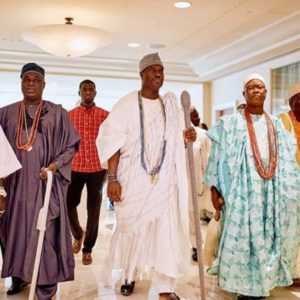
Comment below and share.
